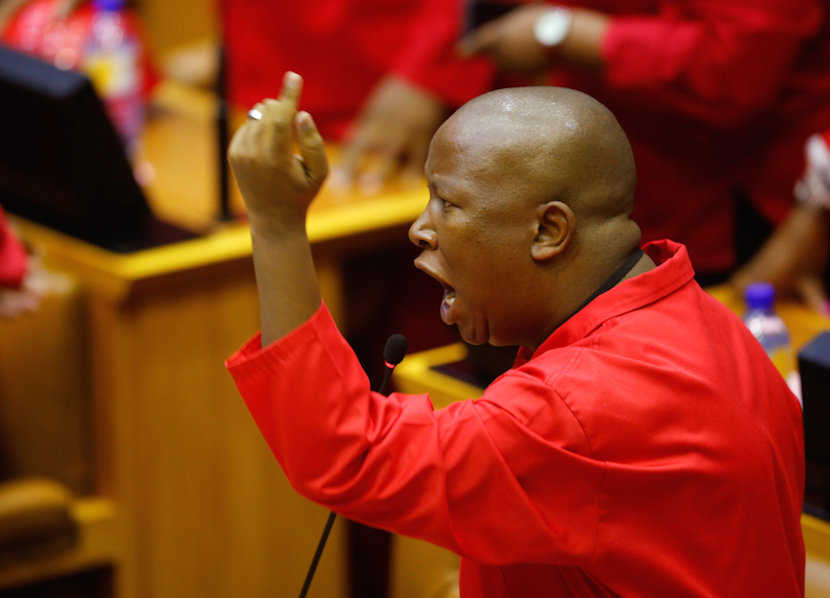The world is getting a clear message through the rise of Donald Trump, Bernie Sanders, Jeremy Corbyn and others with ideas that would previously relegate them to the outskirts of mainline politics: Voters believe the business of governance requires an overhaul. Not least in South Africa, where the pre-democracy negotiated system of proportional representation is proving to be deeply flawed. It has reached a level of extreme dysfunction where representatives are anonymous to those who voted them in, and power has become concentrated in a supreme leader. Little wonder South Africans are reminded daily of how power corrupts, absolute power corrupting absolutely. It is also fertile ground for a feisty entrepreneurial politician like Julius Malema of the EFF who, having judged SA President Jacob Zuma unsuitable to lead the nation, is applying Parliament’s outdated rules to make it impossible for him to do so. The trouble with this approach is that should the EFF succeed in getting Zuma dispatched, what would stop them using the same tactics against his successor? Or, indeed, anyone else with whom they do not agree? – Alec Hogg
From AlJazeera
The battle lines in South Africa’s politics have been drawn after security guards forcibly removed members of the Economic Freedom Fighters (EFF) party when they tried to prevent an address by President Jacob Zuma in parliament.
About 20 EFF members, who were wrestled from their seats by plain-clothed guards on Tuesday, refused to let Zuma speak and shouted down Baleka Mbete, the speaker of the National Assembly.

The EFF argued that Zuma was not fit to address the house after recent court decisions against him. They said they would repeat their disruptive actions until he resigned.
“These bouncers must know that if they give violence, we will respond with violence. We are not scared,” Julius Malema, the EFF leader, said outside parliament.
“Zuma will never find peace in this parliament. Every time he comes here, the same thing will happen.”
Al Jazeera’s Tania Page, reporting from Johannesburg, quoted the EFF as saying: “It is simply doing what its voters wanted it to do: holding the president and parliament to account”.
Read also: Democracy rejuvenated: SA politics now competitive thanks to Malema’s EFF
As Zuma looked on impassively inside the parliament building, the EFF politicians – dressed in their uniform of red workers’ overalls – fought to try to remain in the chamber until they were physically removed through a side door.
He asked political parties to behave with decorum in the assembly and deal with national problems.
“This house needs to do something about itself … I believe that there is a lot that we have to do in this country to fight poverty,” Zuma said.
‘Disgraceful actions’
In a statement, Zuma’s governing African National Congress (ANC) said it wanted the EFF to face charges for its “disgraceful actions” in the assembly.
The actions piled pressure on the ANC in advance of local government elections in August when the party will face a tough challenge from Zuma’s rivals seeking to take advantage of his missteps.
In April, he survived an impeachment vote in parliament launched by the opposition after the constitutional court ruled he had ignored an order to repay state funds spent on his private home.
Later that month, the High Court overturned a previous decision seven years ago to drop 783 corruption charges against Zuma when he was still the country’s deputy president.
Concern over report
In a separate development on Monday, South Africa’s rand hit a two-month low against the dollar and government bonds weakened after a report in the Beeld newspaper hinted that Pravin Gordhan, the finance minister, faced arrest.
The report raised concerns of a repeat of the run on the rand and bonds in December after Zuma changed finance ministers twice in a week.
The government strongly denied the report.
Beeld, citing several sources it said were close to Gordhan, reported that he was aware of the plans to arrest him and was unfazed.
South African news media quoted Mmusi Maimane, South Africa’s opposition leader, as saying: “If finance minister Gordhan is arrested, that would be a profound threat to the economic stability of South Africa.”
Source: http://www.aljazeera.com/news/2016/05/brawl-breaks-south-africa-parliament-160517174544167.html

